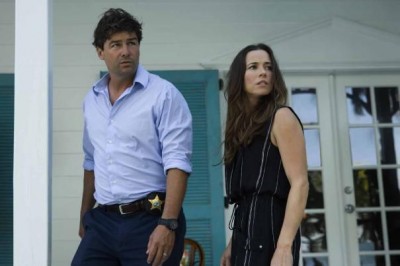
“Sometimes you know something’s coming,” intones detective John Rayburn (Kyle Chandler of “Friday Night Lights” fame) over sweeping shots of the Florida Keys during the opening seconds of “Bloodline,” Netflix’s latest original series offering. “You feel it in the air, you don’t sleep at night, the voice in your head is telling you that something is going to go terribly wrong and there’s nothing you can do to stop it … that’s how I felt when my brother came home.”
That voiceover, in all of its “American Beauty”-esque glory, is essentially the series in miniature: tantalizing, dark, a little overwrought and promising more payoff than it plans on providing.
John is a member of the Rayburn family, a group of locally adored resort owners, famous for their hospitality and status as generally upstanding citizens. Spoiler alert: not all is as it seems.
At the open, the Rayburn parents, Robert and Sally (Sam Shepard and Sissy Spacek), are celebrating their anniversary, as well as a local committee’s decision to dedicate a dock to Robert. This brings John’s brother Danny (a stellar Ben Mendelsohn) home after a long stint away, the cause of which is initially undisclosed. We learn quickly that Danny is the Rayburn’s black sheep, trusted by no one and particularly disliked by his father. But as becomes standard for “Bloodline,” it takes a very long time to find out exactly why.
There are two other Rayburn children. Kevin (Tony-winner Norbert Leo Butz) is a homebody, volatile, but harmless with a loserly disposition and a slight drinking problem. Meg (Linda Cardellini of “Freaks and Geeks”) is an attorney and the family’s designated caretaker, always able to keep a level head and cut through her brothers’ histrionics.
Much of the series hinges on the shifting dynamics and unearthed histories between these four. Each of them has something to lose, something to gain and something to hide at all times, and for all of its genre trappings, the series’ major focus is on the way that the siblings navigate these shady interests. Shepard and Spacek are excellent as Robert and Sally, and their conflicting parenting methods loom over their children’s decisions, but the pair is essentially relegated to the background after the first four episodes or so.
“Bloodline” presents itself as a slow-burning mystery of the tensest variety, utilizing claustrophobic camerawork and a hollowed-out color scheme to suck viewers into the sticky, oppressive decay of the Keys. The Rayburn family has a variety of wounds that await healing, and we find out about these through jarring flash-forwards or stress-induced hallucinations.
To make everyone’s lives worse, John, along with Meg’s longtime boyfriend (also a detective), get tangled up in a murder case that seems to be more entwined with their own lives the harder they look. By the end of the first two episodes — among the series’ best — viewers are left teased, bewildered and tightly wound. But at that point, it all feels intentional. It seems that we’re being presented with an unwritten contract establishing the setup for a grand explosion.
The problem is, that explosion spreads itself out across 12 or 13 muted revelations, most of them telegraphed a mile in advance so as to remove any genuine shock. Moments that characters react to with audible gasps or fits of rage should only elicit knowing shrugs from the viewer. When the pace finally picks up in the last few episodes, it’s too little too late. Intriguing plotlines have been left to die, and one can’t help but feel that five or six hours in the middle of the series could have been thrown out entirely.
At its most plodding, an episode of “Bloodline” can pass by without introducing a single new plot element or resolving an old one. A slow burn requires a constant source of at-least-low heat. The personal storylines don’t quite cut deep enough to hold our attention, while creators Glenn Kessler, Todd A. Kessler and Daniel Zelman hold back on the mystery. For a series so clearly designed for binge watching — as every episode ends on a semi-cliffhanger — this doesn’t work in its favor.
That’s not to say that the proceedings are entirely without merit. “Bloodline” is an incredibly well-produced piece of television. Choosing to shoot on-location in Florida, the show gives an even-handed depiction to the state’s virtues as a tropical paradise and its seedy, poverty-stricken underbelly. It doesn’t have anything particularly new to say about family or the deceptiveness of appearance, but what it says, it says well — particularly about the relationships between fathers and sons. Despite its glacial pacing, there are a few genuine thrills to be found in the series’ expansive runtime.
Above all, though, the performances are stellar from every corner. The show’s structure requires that its actors essentially play two separate characters — a public face and the brewing storm beneath it — and each of the leads pulls this off with flying colors, making the Rayburns perhaps even more believable creations than they are on paper.
Mendelsohn in particular nails Danny’s mix of slimy apathy, pitiful charm and sinister potential. The show pivots on us finding him compelling and, despite its flaws, it succeeds. At the end of the day, Mendelsohn keeps us watching because we truly want to figure out what makes Danny tick and why exactly the family is so polarized in their assessments of him.
Toward the end of the second episode, John Rayburn comes back in with his ominous, from-the-future voiceover. “I always thought the greatest thing that ever happened to me was being born a Rayburn. Now I’m not so sure.” It’s fitting. While “Bloodline” initially sucks us into expectations of greatness, it ultimately leaves us, in the end, not so sure.














